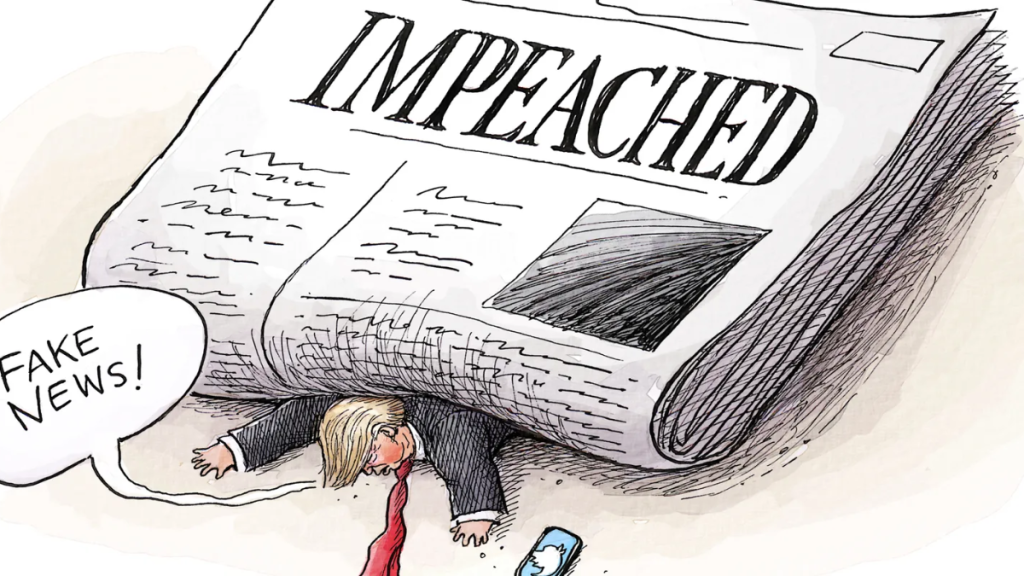As political tension continues to mount, a growing number of lawmakers and legal experts argue that the impeachment of former President Donald Trump is not just a political move—it’s a constitutional necessity.
With ongoing investigations, mounting legal indictments, and escalating rhetoric, many believe the integrity of American democracy demands accountability.
Why Impeachment Is Back on the Table
Though Trump is no longer in office, his influence remains entrenched in American politics. From the Capitol riot on January 6 to ongoing efforts to undermine the 2020 election results, Trump’s critics say he has continuously challenged the rule of law.
While he was impeached twice during his presidency—once for abuse of power and obstruction of Congress and again for inciting insurrection—neither resulted in conviction.
Now, amid fresh legal battles and explosive revelations from court proceedings and special counsel investigations, calls for a third impeachment are gaining steam. Legal scholars argue that should Trump return to public office, he could pose a significant risk to constitutional order.
“Trump’s actions have tested the limits of presidential power, and failure to act sends a message that the highest office in the land is above the law,” said constitutional law professor Laurence Tribe.
The Constitutional Imperative
Article II, Section 4 of the U.S. Constitution makes clear that a president can be removed for “Treason, Bribery, or other high Crimes and Misdemeanors.” Critics argue that Trump’s role in pressuring officials to overturn election results, mishandling classified documents, and alleged obstruction of justice easily meet those standards.
Impeachment is not merely a punitive process—it’s a safeguard to protect democratic institutions. Advocates argue that impeachment, followed by a Senate conviction and a potential ban from holding future office, is necessary to preserve the integrity of future elections and prevent any recurrence of authoritarian overreach.
Supporters also highlight Trump’s continued use of inflammatory rhetoric. From campaign rallies to social media posts, he has persistently targeted political opponents, the justice system, and even military officials, further fueling political polarization.
The Political Reality
Despite mounting pressure, the pathway to impeachment remains politically fraught. The GOP currently controls the House of Representatives, making any movement toward impeachment highly unlikely without bipartisan support. Most Republican lawmakers remain loyal to Trump or are hesitant to alienate his base ahead of the 2024 election.
However, some moderate Republicans have voiced concern over Trump’s conduct. Senator Mitt Romney (R-Utah), a vocal critic, said in a recent interview, “We cannot have a democracy in which losing candidates continue to reject election results. There must be consequences.”
Meanwhile, Democrats, many of whom still bear the scars of past impeachment failures, remain divided. Some believe pursuing impeachment now would only deepen divisions and distract from legislative goals. Others insist that failing to hold Trump accountable undermines the very foundation of American democracy.

Public Sentiment and Media Influence
Recent polls show that public opinion on impeachment remains split. According to a February 2025 Pew Research Center poll, 49% of Americans believe Trump should be disqualified from future office due to his past actions, while 45% believe it would be politically motivated overreach.
Media coverage plays a crucial role in shaping these views. Right-leaning outlets largely frame the ongoing legal cases as politically motivated attacks, while mainstream and progressive outlets highlight them as necessary legal and ethical checks.
Legal analysts warn that a failure to act—or acting too late—could set a dangerous precedent. “What’s at stake is not just one man’s political future but the credibility of our constitutional system,” said former federal prosecutor Glenn Kirschner.
Looking Ahead: Can Congress Act?
If the House Judiciary Committee were to launch an impeachment inquiry, it would need to present clear and convincing evidence of “high crimes and misdemeanors.” Given Trump’s mounting indictments and legal entanglements—ranging from Georgia election interference to federal charges related to classified documents—some legal experts argue the threshold has already been met.
Ultimately, the decision to impeach rests not only on evidence but also on political courage. Lawmakers will need to weigh public opinion, constitutional responsibility, and the long-term impact on democratic institutions.
Failure to act could send a dangerous message—that presidents can abuse power without facing meaningful consequences. For many Americans, that is not a risk worth taking.
For a deeper look into the constitutional and political dynamics behind impeachment, visit Congressional Research Service.
Disclaimer – Our team has carefully fact-checked this article to make sure it’s accurate and free from any misinformation. We’re dedicated to keeping our content honest and reliable for our readers.
